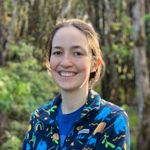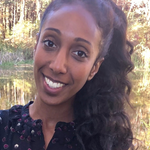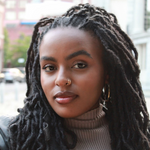Arts & Sciences welcomed five new postdoctoral scholars to the College of Arts & Sciences Society of Fellows in September 2023.
 Lena Champlin’s work bridges Earth Science and art fields to address pressing environmental concerns. Her research examines local anthropogenic impacts on coastal ecosystems and how these intersect with global climate change. At the Academy of Natural Sciences of Drexel University, her dissertation examined coastal water quality over hundreds of years using the biogeochemistry of sediment cores and historical shells. She is interested in using artwork and visual displays to disseminate her science research. Lena has worked on several projects that combine art and science including co-authoring and illustrating children’s books. During her postdoc, her interdisciplinary research will investigate the spatial and temporal patterns of carbon sequestration in salt marshes and apply art in science communication about urban marshes. Lena uses artistic science education through her love of outreach, teaching, and mentorship. In graduate school, she mentored interns through the Women in Natural Sciences (WINS) program, which provides mentorship for female students attending Philadelphia public high schools. She plans to continue mentorship with Upward Bound and GROW programs at BU. She also designed and led outreach activities at the Academy of Natural Sciences museum events. Her goal of bringing art into science communication is to increase the accessibility of environmental science, with a specific focus on DEI and justice in addressing environmental crises.
Lena Champlin’s work bridges Earth Science and art fields to address pressing environmental concerns. Her research examines local anthropogenic impacts on coastal ecosystems and how these intersect with global climate change. At the Academy of Natural Sciences of Drexel University, her dissertation examined coastal water quality over hundreds of years using the biogeochemistry of sediment cores and historical shells. She is interested in using artwork and visual displays to disseminate her science research. Lena has worked on several projects that combine art and science including co-authoring and illustrating children’s books. During her postdoc, her interdisciplinary research will investigate the spatial and temporal patterns of carbon sequestration in salt marshes and apply art in science communication about urban marshes. Lena uses artistic science education through her love of outreach, teaching, and mentorship. In graduate school, she mentored interns through the Women in Natural Sciences (WINS) program, which provides mentorship for female students attending Philadelphia public high schools. She plans to continue mentorship with Upward Bound and GROW programs at BU. She also designed and led outreach activities at the Academy of Natural Sciences museum events. Her goal of bringing art into science communication is to increase the accessibility of environmental science, with a specific focus on DEI and justice in addressing environmental crises.
 Nicholas DePorzio is a theoretical physicist specialized in the field of cosmology, and presently focused on understanding the particle nature of the Universe’s dark matter. His research emphasizes revealing incisive constraints across the broad space of proposed physical theories by identifying new ways to combine diverse astronomical and particle experiment datasets. During his PhD – as a GFSD Research Fellow at Harvard University under the advisement of Professor Cora Dvorkin and Professor Lisa Randall – he investigated how light but massive thermal relic fields and the formation mechanisms of eccentric binary black hole populations imprint information in galaxy surveys, gravitational wave detectors, cosmic microwave background observations, and other astronomical datasets. Nicholas’s current research program includes studying: how ultralight axion fields affect the formation of structure in the Universe and might generate anomalous signals in the cosmic microwave background; generalized signatures of cosmological relics; and the use of binary black holes to probe cosmological epochs beyond the reach of other datasets. Prior to his doctoral studies, Nicholas researched neutrinoless double-beta decay with the CUORE experiment under advisement of Professor Lindley Winslow at MIT and did research with the Compact Muon Solenoid experiment under advisement of Professor Darien Wood and Professor Emanuela Barberis at Northeastern University. Complementary to his research activities, Nicholas has assisted in teaching the graduate Particle Physics and Cosmology course at Harvard, provided research mentorship to several younger students, and enthusiastically embraces cross-field collaborations along with the community workshops and meetings that support them. He is also a fierce proponent of science outreach and science policy, having given numerous public lectures, lobbied congress in support of physics research, and made contributions to the Science in the News, Physics Unlimited Moonshot, Women+ of Color Project, Einstein in the Classroom and Cambridge Science Festival programs.
Nicholas DePorzio is a theoretical physicist specialized in the field of cosmology, and presently focused on understanding the particle nature of the Universe’s dark matter. His research emphasizes revealing incisive constraints across the broad space of proposed physical theories by identifying new ways to combine diverse astronomical and particle experiment datasets. During his PhD – as a GFSD Research Fellow at Harvard University under the advisement of Professor Cora Dvorkin and Professor Lisa Randall – he investigated how light but massive thermal relic fields and the formation mechanisms of eccentric binary black hole populations imprint information in galaxy surveys, gravitational wave detectors, cosmic microwave background observations, and other astronomical datasets. Nicholas’s current research program includes studying: how ultralight axion fields affect the formation of structure in the Universe and might generate anomalous signals in the cosmic microwave background; generalized signatures of cosmological relics; and the use of binary black holes to probe cosmological epochs beyond the reach of other datasets. Prior to his doctoral studies, Nicholas researched neutrinoless double-beta decay with the CUORE experiment under advisement of Professor Lindley Winslow at MIT and did research with the Compact Muon Solenoid experiment under advisement of Professor Darien Wood and Professor Emanuela Barberis at Northeastern University. Complementary to his research activities, Nicholas has assisted in teaching the graduate Particle Physics and Cosmology course at Harvard, provided research mentorship to several younger students, and enthusiastically embraces cross-field collaborations along with the community workshops and meetings that support them. He is also a fierce proponent of science outreach and science policy, having given numerous public lectures, lobbied congress in support of physics research, and made contributions to the Science in the News, Physics Unlimited Moonshot, Women+ of Color Project, Einstein in the Classroom and Cambridge Science Festival programs.
 Kerstin Francis is a premodernist working at the intersections of the history of science, networks of power, and LGBTQ+ studies in medieval and early modern literature. Her current book project, “Queer Magic: Sodomy, Sin and The Supernatural, 1150-1650,” uses the premodern framework of sins contra naturam and transhistorical theories of fictionality to argue that contemporary authors used literary magic to engage in queer and trans imaginings of bodies, relationships, and sexual acts. Her second project, “Fetishizing the Past: Historophilia and Premodern Sexuality,” interrogates medieval and early modern narratives of sexual desire that depend upon the pleasurable tension between past and present, engaging in what Kersti terms historophilia: an eroticism generated by the self-conscious interplay of dissonant temporalities. Kersti has also worked extensively on early modern histories of science, focusing on the role of alchemy in the Latin Christian West and the Dar al-Islam; on depictions of Mary Magdalene in medieval and Victorian understandings of prostitution; and on the figure of the meykongr (maiden-king) in the Old Norse saga tradition. You can find Kersti’s writing in the Bulletin of the International Association for Robin Hood Studies, Comitatus, The Digital Medievalist, the Los Angeles Review of Books, Medieval Feminist Forum, Painful Pleasures: Sadomasochism in the Middle Ages, and Public Books, or on the podcasts “Classical Ideas” and “The Multicultural Middle Ages.” Her work has been supported by the Society for Medieval Feminist Scholarship, the Andrew W. Mellon Foundation, The Ahmanson Foundation, The National Science Foundation, The History Channel, and the UCLA Center for Medieval and Renaissance Studies, among others.
Kerstin Francis is a premodernist working at the intersections of the history of science, networks of power, and LGBTQ+ studies in medieval and early modern literature. Her current book project, “Queer Magic: Sodomy, Sin and The Supernatural, 1150-1650,” uses the premodern framework of sins contra naturam and transhistorical theories of fictionality to argue that contemporary authors used literary magic to engage in queer and trans imaginings of bodies, relationships, and sexual acts. Her second project, “Fetishizing the Past: Historophilia and Premodern Sexuality,” interrogates medieval and early modern narratives of sexual desire that depend upon the pleasurable tension between past and present, engaging in what Kersti terms historophilia: an eroticism generated by the self-conscious interplay of dissonant temporalities. Kersti has also worked extensively on early modern histories of science, focusing on the role of alchemy in the Latin Christian West and the Dar al-Islam; on depictions of Mary Magdalene in medieval and Victorian understandings of prostitution; and on the figure of the meykongr (maiden-king) in the Old Norse saga tradition. You can find Kersti’s writing in the Bulletin of the International Association for Robin Hood Studies, Comitatus, The Digital Medievalist, the Los Angeles Review of Books, Medieval Feminist Forum, Painful Pleasures: Sadomasochism in the Middle Ages, and Public Books, or on the podcasts “Classical Ideas” and “The Multicultural Middle Ages.” Her work has been supported by the Society for Medieval Feminist Scholarship, the Andrew W. Mellon Foundation, The Ahmanson Foundation, The National Science Foundation, The History Channel, and the UCLA Center for Medieval and Renaissance Studies, among others.
 Jacqueline Georgis has associations with the African American & Black Diaspora Studies, Musicology, & Ethnomusicology departments. Georgis received her PhD in Ethnomusicology from Yale University in May 2022. During her graduate studies, she was a visiting researcher in both Denmark and Portugal, at the School of Culture and Society at Aarhus University (2020) and at the Instituto de Etnomusicologia (INET) at the Universidade de Lisboa (2019). Her doctoral dissertation, “Batida of the Diaspora”, examines ideas of cultural hybridity and transnational exchange within the Lusophone-Atlantic. Through the lens of “batida”, a contemporary African-inspired electronic dance music created in Lisbon, Portugal, Lin traces the roots and development of Luso-African music in Lisbon from the mid-20th century to today, investigating the ways in which local producers, DJs, and record label managers have created alternative spaces of Afro-diasporic cultural expression and visibility. You can read her work on Lisbon’s batida music in Sonic Signatures (2023), an edited volume on the phenomenon of migrant and mobile music-making at night. Lin has held teaching positions in the music departments at College of the Holy Cross (2022-2023) and Tufts University (Spring 2022), and has taught a wide range of courses, from seminars such as “Beats of the Black Atlantic” and “Musical Encounters in the Lusophone World” to larger lecture courses like “Topics in World Music”, “History of Rock”, and “American Popular Song.” When she’s not teaching or doing research, Lin enjoys making music! As a classically trained cellist, Lin has played concerts with various orchestras, from the Orchestra Lamoureux in Paris to local orchestras around Boston, including The Apollo Orchestra and The Boston Reading Orchestra.
Jacqueline Georgis has associations with the African American & Black Diaspora Studies, Musicology, & Ethnomusicology departments. Georgis received her PhD in Ethnomusicology from Yale University in May 2022. During her graduate studies, she was a visiting researcher in both Denmark and Portugal, at the School of Culture and Society at Aarhus University (2020) and at the Instituto de Etnomusicologia (INET) at the Universidade de Lisboa (2019). Her doctoral dissertation, “Batida of the Diaspora”, examines ideas of cultural hybridity and transnational exchange within the Lusophone-Atlantic. Through the lens of “batida”, a contemporary African-inspired electronic dance music created in Lisbon, Portugal, Lin traces the roots and development of Luso-African music in Lisbon from the mid-20th century to today, investigating the ways in which local producers, DJs, and record label managers have created alternative spaces of Afro-diasporic cultural expression and visibility. You can read her work on Lisbon’s batida music in Sonic Signatures (2023), an edited volume on the phenomenon of migrant and mobile music-making at night. Lin has held teaching positions in the music departments at College of the Holy Cross (2022-2023) and Tufts University (Spring 2022), and has taught a wide range of courses, from seminars such as “Beats of the Black Atlantic” and “Musical Encounters in the Lusophone World” to larger lecture courses like “Topics in World Music”, “History of Rock”, and “American Popular Song.” When she’s not teaching or doing research, Lin enjoys making music! As a classically trained cellist, Lin has played concerts with various orchestras, from the Orchestra Lamoureux in Paris to local orchestras around Boston, including The Apollo Orchestra and The Boston Reading Orchestra.
 Austin Lee engages Black feminist theorizations of power and difference to examine the interconnectedness between antiblackness and norms surrounding gender and sexuality. Through her scholarship, she draws attention to how antiblackness relates to heterosexism and propagates norms related to sexuality and gender, such as the essentiality of the nuclear family structure, gender conformity, and compulsory heterosexuality. Her current project focuses on the experiences of working- and middle-class mothers and childless women to examine Black women’s experiences with motherhood and mothering. By analyzing themes related to motherhood, caretaking, and class, her research contributes to a broader understanding of race, gender, and family dynamics.
Austin Lee engages Black feminist theorizations of power and difference to examine the interconnectedness between antiblackness and norms surrounding gender and sexuality. Through her scholarship, she draws attention to how antiblackness relates to heterosexism and propagates norms related to sexuality and gender, such as the essentiality of the nuclear family structure, gender conformity, and compulsory heterosexuality. Her current project focuses on the experiences of working- and middle-class mothers and childless women to examine Black women’s experiences with motherhood and mothering. By analyzing themes related to motherhood, caretaking, and class, her research contributes to a broader understanding of race, gender, and family dynamics.